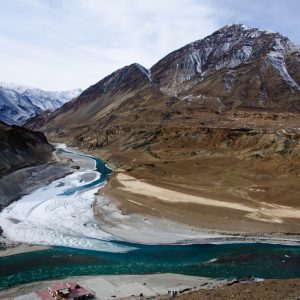Federal Water Tap, February 13: Senate Democrats Reveal Trillion-Dollar Infrastructure Outline
The Rundown
Democrats’ proposal includes at least $US 110 billion for water and sewer systems. Dakota Access pipeline receives final Army Corps approval. TransCanada resubmits its application to build the Keystone XL pipeline. Congress passes a resolution to invalidate an Obama administration rule to protect streams from coal mining waste. USGS researchers publish five regional groundwater studies.
“Yet, despite its critical importance to our lives and our economy, we have allowed our nation’s infrastructure to fall in to a state of disrepair. Today, we spend less on infrastructure as a percentage of GDP than at any time in the past twenty years, and the results are plain to see…Local governments are stuck with the impossible choice of allowing water and sewer systems to deteriorate further or raising local taxes.” — Introduction to the infrastructure “blueprint” promoted by Senate Democrats.
By the Numbers
14 million: Number of well drillers’ records used to compile a database of aquifer characteristics for 25 northern U.S. states that were shaped by glaciers. (U.S. Geological Survey)
News Briefs
Democrats’ Infrastructure Plan
They call it a “blueprint.” But it is instead a rough sketch.
Senate Democrat unveiled their wish list for federal investment in U.S. infrastructure, outlining a broad $US 1 trillion plan that includes $US 110 billion for water and sewer systems.
The backbone of the proposal for water is more grant money instead of loans and requiring local governments to put up fewer matching funds. The result would be a larger federal investment in any given project.
Dakota Access Approval
Less than 10 days after President Trump signed an executive order promoting the Dakota Access pipeline, the U.S. Army Corps of Engineers said in a court filing that it would allow the pipeline company to drill beneath Lake Oahe and complete the 1,172-mile oil conduit, Reuters reports.
Keystone XL
Pipeline developer TransCanada resubmitted its application to the State Department to build the Keystone XL pipeline. On January 24, four days after taking office, President Trump invited the company to reapply. The Obama administration determined in November 2015 that the pipeline, an icon of climate change protest, was not in the “national interest.”
Congress Votes Against Stream Protection Rule
The House and Senate both approved a resolution to withdraw a rule to protect streams from coal mining waste. Because it was finalized in the final weeks of the Obama administration the rule is subject to review by the new Congress. President Trump will most likely approve the cancellation of the rule.
Studies and Reports
USGS Groundwater Quality
The U.S. Geological Survey published water quality studies of five regional groundwater systems. Nitrate, often from fertilizers, was the most common pollutant from manmade sources while arsenic, fluoride, and manganese were the most frequent naturally occurring contaminants.
The regional groundwater systems include: Basin and Range, Piedmont/Blue Ridge, Northern Atlantic Coastal Plain, Southern Coastal Plain, and Gulf Coast Lowlands.
Record Sierra Nevada Snow
The weekly water and climate report from the Natural Resources Conservation Service highlights the gobsmacking amount of precipitation that has washed over California in recent weeks. After a three-year drought emergency, parts of the state are on track for their wettest year on record.
On the Radar
Advisory Committee on Water Information Meeting
The committee, which consults with federal agencies on water data, will hold a public meeting on February 22 from 8:30 a.m. until 5:00 p.m. Eastern. On the agenda: groundwater and national water data. The meeting will be available online via webinar and teleconference.
Federal Water Tap is a weekly digest spotting trends in U.S. government water policy. To get more water news, follow Circle of Blue on Twitter and sign up for our newsletter.
Brett writes about agriculture, energy, infrastructure, and the politics and economics of water in the United States. He also writes the Federal Water Tap, Circle of Blue’s weekly digest of U.S. government water news. He is the winner of two Society of Environmental Journalists reporting awards, one of the top honors in American environmental journalism: first place for explanatory reporting for a series on septic system pollution in the United States(2016) and third place for beat reporting in a small market (2014). He received the Sierra Club’s Distinguished Service Award in 2018. Brett lives in Seattle, where he hikes the mountains and bakes pies. Contact Brett Walton





